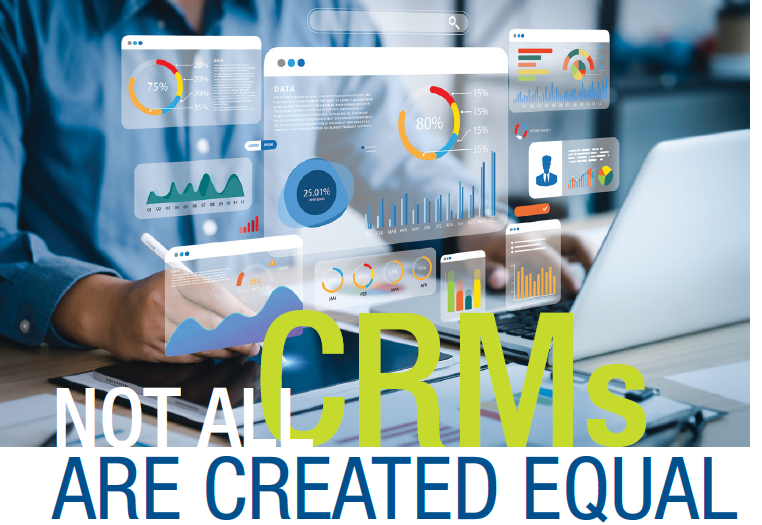 |
| istockphoto.com |
Understand the necessary functions distributors require for full-scale supply chain success.
by Rachael Radford
Unlike retail, industrial distribution requires strong B2B relationships with manufacturers, suppliers, and customers over long sales cycles. Repeat business, complex orders, and specialized pricing structures make CRM integration essential for tracking customer interactions, automating workflows, and improving demand planning.
However, not all CRM platforms are built for industrial distribution. Many tools marketed as CRMs started as project management or marketing automation platforms and may not fully meet the unique challenges of supply chain-focused businesses.
UNDERSTAND THE DIFFERENCE
In today’s crowded software landscape, it’s easy to confuse true CRMs with platforms that claim CRM functionality but lack core features required for industrial sales success. A true CRM is purpose-built to manage customer relationships across long sales cycles, track pipeline movement, automate follow-ups, and integrate tightly with ERP systems for operational harmony.
By contrast, some platforms marketed as CRMs are, at their core, project management tools, collaboration boards, or marketing software with bolt-on CRM features. These may offer contact storage or deal tracking but often fall short in areas like sales forecasting, lead nurturing, workflow automation, or ERP integration—functions critical to industrial distribution.
For example, a distributor may adopt a visual task board system labeled as a CRM only to find that it lacks the depth to manage complex B2B contracts, multi-stage sales, or reorder triggers. This leads to manual workarounds, misaligned teams, and lost efficiency.
Understanding the distinction helps industrial businesses avoid investing in a platform that can’t scale with their needs or support the strategic goals of supply chain and sales alignment.
If your business needs a true CRM, start by getting clear on your requirements. What processes will live in the system? What do you want it to track? What do you need it to tell you—through dashboards or reports? Look at whether the platform was originally built as a CRM or pivoted from something else, like project management or task management. If it claims to be many things but didn’t start as a CRM, it’s likely not robust enough for industrial use.
In this article, we’ll explore what CRM really means in different contexts, how it differs from ERP systems, and how industrial distributors can choose the right CRM to optimize their sales and operations.
CRM VERSUS ERP
Many industrial distributors already use Enterprise Resource Planning (ERP) systems to manage procurement, inventory, and financials. However, while ERPs optimize back-office operations, CRMs focus on sales, customer interactions, and business growth.
Key differences:
- CRM for sales and customer relationships tracks long B2B sales cycles, manages customer touchpoints, and personalizes interactions.
- ERP for supply chain management manages logistics, procurement, and inventory tracking to ensure smooth operations.
Why do the differences matter? Some ERPs include CRM-like features, such as order history tracking and basic customer management. However, they often lack robust sales automation, marketing tools, and engagement tracking that a full CRM provides.
For example, an industrial supplier selling specialized machinery may need a CRM to: (1) track each lead from initial inquiry to post-sale service; (2) automate reminders for follow-ups, contract renewals, and maintenance services; and (3) ensure that inventory levels match sales forecasts to avoid delays or stockouts.
A well-integrated CRM allows sales and supply chain teams to collaborate effectively, ensuring sales forecasts align with inventory levels and production schedules.
 |
| istockphoto.com |
USING CRM TO IMPROVE SUPPLY CHAIN SUCCESS
For industrial distributors, a CRM isn’t just about managing leads, it’s about improving the entire sales and supply chain workflow.
1. Demand forecasting and inventory management.
A robust CRM allows distributors to: (1) analyze purchasing patterns to predict demand and adjust procurement strategies; (2) integrate sales data with ERP systems, optimizing inventory levels and reducing overstock or shortages; and (3) track order histories to plan for seasonal fluctuations and supply chain disruptions.
For instance, a distributor of industrial fasteners can use CRM insights to anticipate increased demand before a major infrastructure project starts, ensuring enough stock is available to meet customer needs.
2. Strengthening supplier and vendor relationships.
Many distributors rely on multiple suppliers for different components or materials. A CRM helps by: (1) tracking supplier interactions, including past pricing agreements, lead times, and reliability; (2) providing real-time insights to help distributors select the most reliable suppliers; and (3) automating supplier performance tracking, ensuring distributors can pivot if a vendor fails to deliver on time.
For example, a building materials distributor can use CRM data to determine which supplier has historically fulfilled orders fastest and most accurately, allowing for smarter procurement decisions.
3. Enhancing long sales cycles and customer retention.
Industrial sales cycles can span months or years, requiring continuous nurturing and engagement. A CRM enables: (1) automated follow-ups to ensure leads don’t go cold; (2) sales tracking tools to help sales reps manage complex, multi-stage deals; and (3) personalized promotions, service agreements, and bulk order discounts to boost customer retention.
For instance, a medical equipment supplier can use CRM-generated insights to proactively offer discounted bulk orders to hospitals preparing for peak flu season.
4. Improving order accuracy and reducing delays.
A CRM with automated quote generation and order tracking ensures customers receive accurate pricing and availability information. Also, (1) CRM-ERP integration reduces manual data entry, minimizing errors; (2) faster order processing prevents delays and improves customer satisfaction; and (3) automated contract renewals keep repeat customers engaged and loyal.
For example, a chemical distributor can integrate CRM with ERP to ensure real-time compliance tracking, preventing costly shipment errors or regulatory violations.
5. Increasing operational efficiency and sales productivity.
CRMs centralize communication across departments, ensuring that: (1) sales, procurement, and logistics teams work from the same data set; (2) field sales teams access real-time data remotely, improving customer response times; and (3) automated reporting tools provide management with insights into sales trends, lost opportunities, and operational inefficiencies.
For example, a heavy machinery distributor can use CRM to ensure that field sales reps and warehouse staff have synchronized inventory data, reducing errors when promising delivery dates to customers.
CHOOSING THE RIGHT CRM
Not all CRMs are suited for industrial distributors. Some platforms, like Salesforce and HubSpot, were built as full-scale CRMs with extensive customer engagement tools. Others, like monday.com, began as task management tools and later added CRM-like features, though they lack critical industrial sales functions.
Distributors should look for these key features:
- ERP integration. Ensures a seamless connection between sales, inventory, and fulfillment systems.
- Sales pipeline management. Tracks long-term B2B sales cycles and repeat orders.
- Customization and scalability. Adapts to complex distribution models and specialized sales processes.
- Automation and AI insights. Provides predictive analytics and automated follow-ups to improve efficiency.
- Mobile accessibility. Allows field sales teams to access real-time customer and order data from anywhere.
For instance, a plumbing and HVAC distributor might need a CRM with field service tracking, while a steel distributor may require automated contract renewals to ensure steady client retention.
HOW CRM HELPED AN INDUSTRIAL DISTRIBUTOR SCALE OPERATIONS
A Midwest-based industrial tools distributor struggled with long response times, lost leads, and inventory mismatches. By integrating a CRM with their ERP, they:
- Reduced order processing time by 30%, ensuring faster deliveries.
- Improved forecasting accuracy, reducing overstocking by 20%.
- Automated follow-ups, leading to a 15% increase in repeat orders.
By streamlining sales and inventory data, they achieved higher efficiency, increased customer satisfaction, and stronger supplier relationships.
For industrial distributors, CRM is more than a sales tool – it’s a critical asset for supply chain efficiency, customer retention, and business growth. By integrating CRM with ERP systems, distributors can improve demand forecasting, strengthen supplier relationships, and reduce inefficiencies.
Choosing the right CRM isn’t just about tracking leads, it’s about optimizing the entire sales and supply chain ecosystem.
In the industrial supply industry, where precision, timing, and relationships matter, CRM isn’t optional – it’s critical.
EDITOR’S NOTE: Watch for our special series of Online Exclusives on CRMs in the Industrial Supply Weekly newsletter beginning May 22.
 |
Rachael Radford is the founder of Meira Consulting Inc. (https://meiraconsulting.Com/) with 10+ years of tech implementation experience, including selection, implementation, and adoption across supply chain, ERP, e-commerce, and net new tech development. She has worked with organizations across industries, continents, and sizes and helped companies to select and implement their most critical systems. She can be reached at: rachael@meiraconsulting.com.
This article originally appeared in the May/June 2025 issue of Industrial Supply magazine. Copyright 2025, Direct Business Media.












